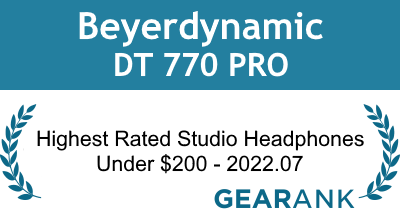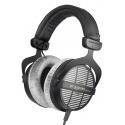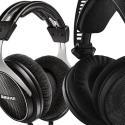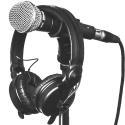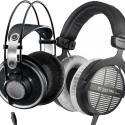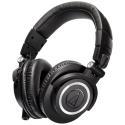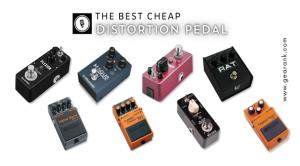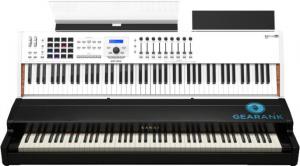Beyerdynamic DT 770 PRO (250 Ohm) Review - Closed Back Headphones
Street Price:
Manufacturer:
Product Links:
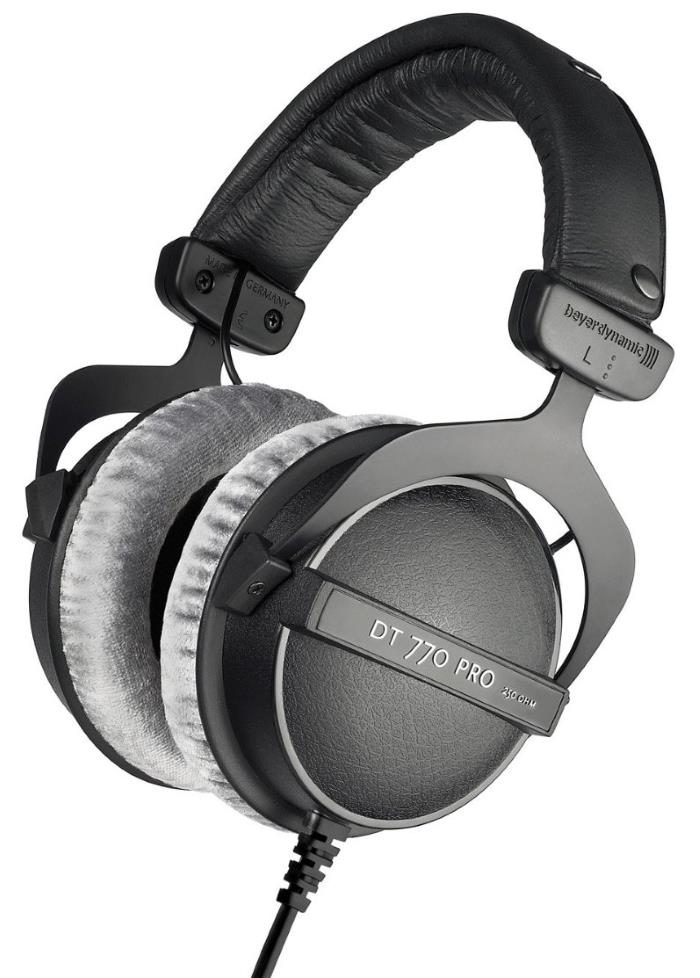
Gearank High Notes
- 2022.07: Highest Rated Closed Back Headphones for Recording from $100 to $200
- 2022.07: Highest Rated Studio Headphones Under $200 - Max 250 ohm
- 2022.01: Equal Highest Rated Studio Headphones Under $200 - Max 250 ohm
Tied With:- Audio-Technica ATH-M50x
Beyerdynamic DT 770 PRO (80 Ohm)
Beyerdynamic DT 990 PRO
- Audio-Technica ATH-M50x
- 2022.01: Equal Highest Rated Closed Back Headphones for Recording from $100 to $200
Tied With:- Audio-Technica ATH-M50x
Beyerdynamic DT 770 PRO (80 Ohm)
- Audio-Technica ATH-M50x
- 2021.01: Equal Highest Rated Studio Headphones Under $200
Tied With:- Audio-Technica ATH-M50x
Beyerdynamic DT 770 PRO (80 Ohm)
Beyerdynamic DT 990 PRO
- Audio-Technica ATH-M50x
- 2021.01: Equal Highest Rated Closed Back Headphones from $100 to $200
Tied With:- Audio-Technica ATH-M50x
Beyerdynamic DT 770 PRO (80 Ohm)
- Audio-Technica ATH-M50x
- 2020.02: Highest Rated Studio Headphones Under $200
- 2018.04: Highest Rated Closed Back Headphones Under $200
- 2017.09: Highest Rated Closed Back Headphones Under $200
- 2016.03: Equal Highest Rated Closed Back Headphones Under $200
Tied With:- Audio-Technica ATH-M50x
- Audio-Technica ATH-M50x
Lucky 770
It's not a coincidence that the Beyerdynamic DT 770 PRO is as popular as it is right now given how long it has been on the market.
It's one of my most recommended headphones to peers that ask me what headphones to get. But what makes it so special?
When its first incarnation, the DT 770, originally released in 1985, studios all over including the BBC1 quickly adapted it as their preferred studio headphones. The original's long term durability, excellent sound and great comfort made it ideal for long studio sessions. My experience with the current incarnation, the DT 770 PRO started in a very similar environment.
Like many aspiring audio engineers, I started out by working with headphones. At first I used what I could afford, and back then, all I had access to were generic, OEM headphones. They didn't sound very good and for that, my early mixes suffered. When I started interning at a local studio and learning the ropes, I was floored at how good music could sound like -- and how bad my mixes sounded. More importantly, the studio had a pair of Beyerdyamic DT 770 Pros that I absolutely adored using.
Specifications
- Driver Size: 45 mm
- Frequency Response: 5 Hz to 35 kHz
- Impedance: 80 Ohms
- Sensitivity: 96 dB
- Max Input Power: 100 mW
- Weight: 270g without cable (0.55 lbs)
- Connectivity: 3m coiled cable with a gold plated 1/8" plug and 1/4" adapter.

The DT 770 PRO has a spartan but solidly built quality to it that inspires confidence in its long term durability.
At the time, I thought they were expensive headphones going for upwards of $400. I never bothered to look it up or ask about them. I just know that they sounded good and when I mixed on them, I felt confident that they would translate well on the monitors and on other listening devices. I was surprised when I found out that they weren't as expensive as i thought. So when I started doing my own work and building up my own studio at home, they were the first on my list of purchases.
Starting with the outside, the DT 770 Pros were designed to be spartan and easily serviceable. The foam pads are washable and if they eventually give out, they are replaceable. This goes the same for the headband. Beyerdynamic sells spare parts in case your unit gives out. I've had my current pair for 6 years and I've only had to replace the foam pads twice in that time. The drivers are still holding up.
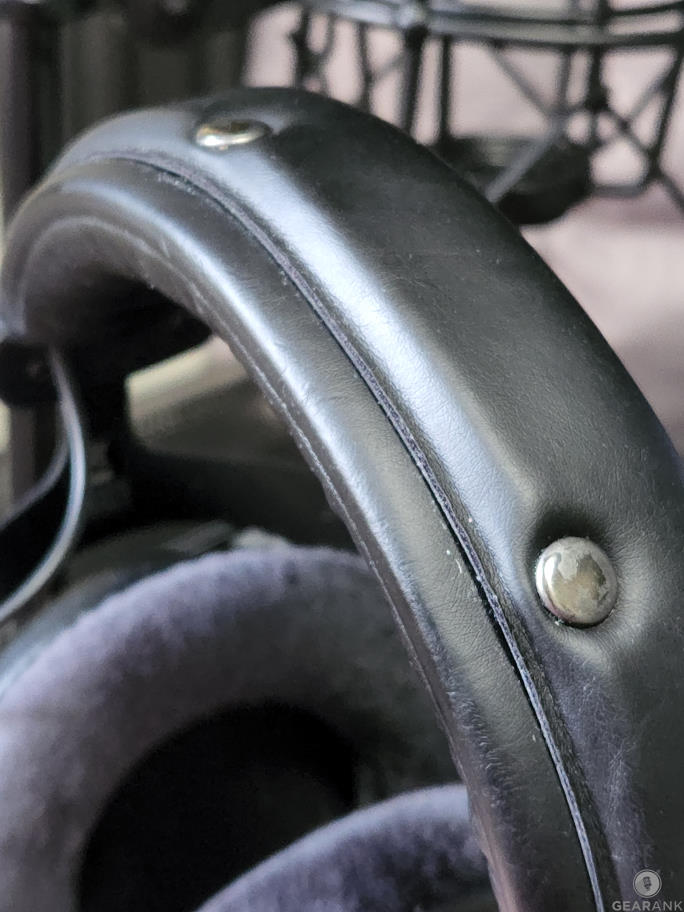
The leatherette headband is soft to the touch but is surprisingly durable. Even with wear, Beyerdynamic offers replacements for most of the parts on the headphone including the headband.
They also have a good clamping force that doesn't feel uncomfortable. The plush pads help in that regard. This is important for long studio sessions where singers or engineers need to wear them for extended periods of time.
Speaking of the drivers, the DT 770 PRO sports 45mm drivers with Neodymium magnets. This gives it a fast response and great frequency range extension on the high and low end. Speaking of which, the low frequency range of the DT 770 PRO is one of the most balanced I've heard in a pair of headphones. It manages to avoid big spikes around 100Hz while extending the lows below 50hz smoothly. Most closed back headphones suffer from compromising low frequency extension with low frequency impact at the 100Hz area. The chamber tuning is one of the best in the industry. Despite being a closed-back design, it has very spacious soundstage.
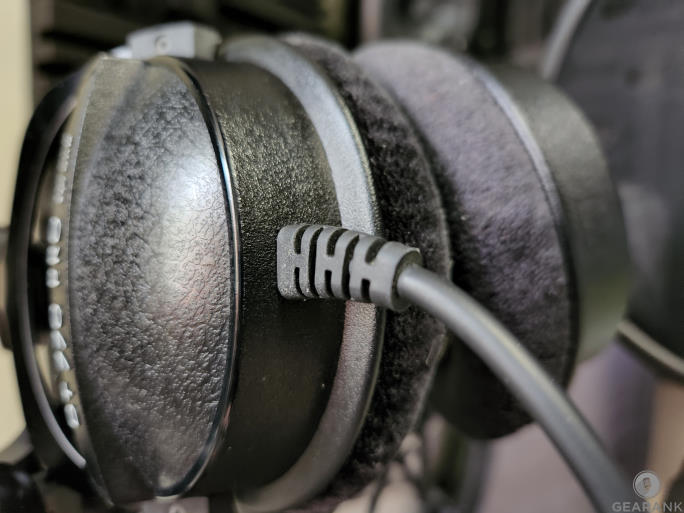
Visible here is the dome-like driver enclosure. While it is a closed-back design, it has a surprisingly wide soundstage.
The Midrange also sounds even across the range without any standout resonances or bumps. This makes balancing instruments with vocals intuitive and helps with translation to other listening devices.
Continuing on to the high end, the extended frequency range gives just enough air to the headphones. This is where my gripes with the headphones start. It is VERY sibilant. Listening to Ariana Grande's "Positions" album was a painful affair and when I was tasked to reference it for a client's mix, I couldn't listen to it for more than 10 minutes without ear fatigue. Granted the album was noted by audiophiles to be a particularly sibilant master, The DT 770 PRO just emphasizes it to painful degrees.

Beyerdynamic thoughtfully put in Braille dots to indicate earcup sides.
This can work to your advantage if you prefer warmer sounding mixes as the bias will make you cut more high end from your tracks. The problem is you might end up cutting too much. Cross referencing is key to take full advantage of the DT 770 PRO's low frequency and midrange strong points.
Another con I have is that the velour pads are prone to getting dirty. The pads and the inner foam are dust (and pet fur) magnets. Although removing them to clean them is easy, It's an added chore especially if they're studio headphones. For hygienic purposes, you may end up having to wash them after every session!

I tried to get this earcup as clean as possible for this shot. I used tape, and a small vacuum I use for keyboards but it's tough to get some of the dust and pet fur out without washing.
The lack of a removable/replaceable cable has been a longtime concern for people but personally, I never found the coiled cable troublesome.
So going back to the question I posed at the beginning: What makes the DT 770 PRO so special?
It's a combination of the extended low frequency range, neutral mids, along with great long term durability that makes the DT 770 PRO a great choice for studios of all sizes. Smaller studios that don't have studio monitors (yet) can benefit from their mixes translating properly. Larger studios have them because they're great tracking headphones. For drummers, the clamping force is enough to stay on even through the most energetic performances.
The fact that the DT 770 PRO provides all of these while still being at a price not too out of reach of even the most frugal of engineers is why I wholeheartedly recommend these to every person that ask me what headphones to buy. One important note however is the 250 Ohm unit I have works best with a headphone amp that can drive it. The 80 Ohm version sounds similar albeit with a slightly slower transient response on the low frequency. I have no experience with the 32 Ohm version but I am aware it's tuned for mobile devices and laptop headphone jacks.
Cons
- Can get sibilant
- Pads pick up dirt and absorb sweat
- Non-detachable cable
Pros
- Great low frequency extension
- Neutral midrange
- Excellent comfort and fit
- Long term durability
Overall
The DT 770 PRO is a must have for every studio. It is a great all-rounder for tracking, mixing and even mastering when you have to check the low end balance of your tracks. The treble may be sibilant at times but once you get used to it, you will be rewarded with mixes that translate.
Gearank Recommended
At publication time we were recommending this in our guides to:



